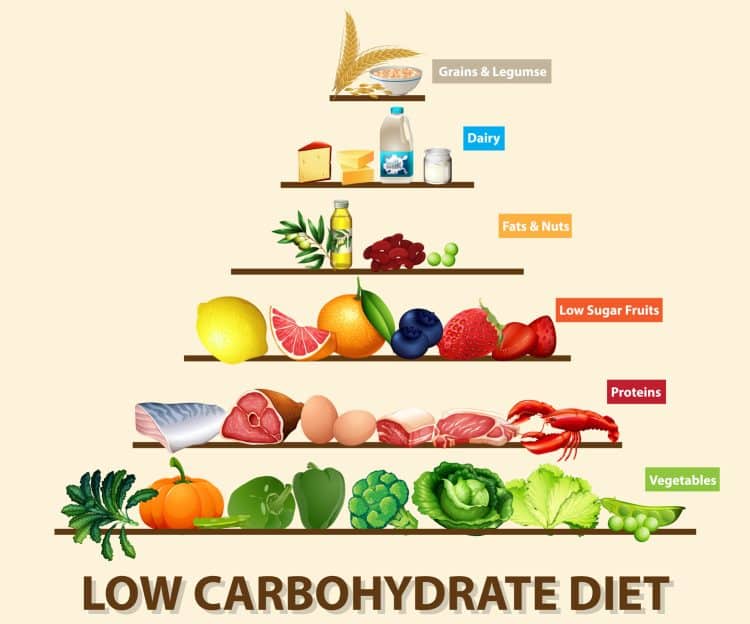Most overweight or obese people struggle with shedding weight. Many obese folks try multiple diets, yet only a handful successfully achieve their weight loss goals.
Low-carb intermittent fasting has become popular in fitness and health circles, with people using it to improve their health and maintain a simple lifestyle. In this article, we will discuss several studies that have found that intermittent fasting can have a powerful effect on the brain and body. For a beginner’s guide to low-carb intermittent fasting, keep reading.
How Does Low-Carb Intermittent Fasting Help?
What happens when you are on a keto diet with no carbs and you are fasting intermittently? The fat-cell-burning process expedites, and the body stays in ketosis for longer.
If you don’t eat a lot of carbs during the fasting period, your body will use fat as its main energy source instead of glucose. You’ll also see lower blood sugar levels on a diet focused on limiting carb intake.
This phenomenon holds true for people looking to lose weight, especially when mixing a keto diet with low-carb intermittent fasting because of the intensified metabolic switch.

There is scientific evidence to prove that a low-carb intermittent fasting plan boosts the metabolic process and increases ketone production in the liver. The liver produces ketones as it breaks down fats for energy, which helps lower your body’s glycogen stores. [1]
You will spike your blood sugar levels if you eat high-carb foods in the intermittent fasting eating window. Instead, go for low-carb foods from the ketogenic diet for rapid weight loss.
When you follow a low-carb plan, it will also lower triglycerides in your body. Triglycerides are tasked with redistributing fat cells through the blood and play a part in insulin resistance and fat storage.
This article examines how low-carb eating plans coupled with intermittent fasting can help you lose weight and get improved health benefits.
Benefits of Going Low-Carb on an Intermittent Fasting Diet
Intermittent fasting coupled with a low-carb diet delivers excellent results. For example, combining the 16/8 IF plan with the low-carb diet will yield the best fat-burning results.
1. Reach Ketosis Stage Faster
One of the biggest benefits of intermittent fasting is entering the state of ketosis. In this metabolic state, your body starts burning fat for energy. This happens when you restrict your calories and carbohydrates to a certain point.
By going low-carb on an intermittent fasting diet, you can reach ketosis faster than if you were following a traditional ketogenic diet. [2]
It happens because your body will not retain as much glucose from the ingested carbs for energy conversion and must turn over to the fat cells. Your body thus enters ketosis and ramps up your metabolism.
2. Enhanced Weight Loss
Weight watchers and health-conscious people choose a low-carb diet with the 14/10 or 16/8 intermittent fasting plan to assist them with weight loss.
Ketosis does not only burn fat for energy. It also removes fat molecules from your system and prevents their buildup in your body.
Adopt a low-carb eating plan during your eating windows to increase fat loss [3]. You should avoid crash diets and switch to a low-carb IF diet plan if your goal is to shed weight on a deadline.
A low-carb diet reduces your appetite and diminishes hunger pangs. You will feel full for longer instead of experiencing spikes and dives in blood sugar levels throughout the day. It will make it easier for you to fast for extended periods and mix extraneous meals in the alternate-day eating windows.

3. Helps Manage Diabetes and Insulin Levels
It is a direct health benefit. You lower your insulin levels when you eat fewer carbs that your body utilizes to make sugar [4]. Also, by reducing insulin levels, other health issues like heart disease and diabetes are avoided. Though insulin is one of the many building blocks of your body, high blood sugar levels are hazardous for you.
High amounts of blood sugar are stored in your liver as glycogen. It can impact the various processes in the liver and pancreas that are necessary for maintaining healthy insulin levels.
When you give your body an alternative energy source by burning fat, you will lose weight and allow your system to flush out the extra glycogen safely. All in all, a low-carb fasting regimen will lower your blood sugar levels.
Fasting periods are effective for people with low blood sugar as they decrease the hunger hormone leptin and boost adiponectin levels [5]. Adiponectin is a protein hormone that regulates glucose levels and prevents insulin resistance.
When low-carb diets combine with intermittent fasting, it increases hormone-managing insulin and reduces your risk of diabetes in the long run. [6]
Foods To Consume While Low-Carb Intermittent Fasting
While only low-carb foods are allowed in this diet plan, you can still enjoy various delicacies in this diet plan.
Your target in a low-carb fasting plan is to restrict the carbs in your food and let your body burn fat for fuel. Following such a diet will make you feel lighter, more energetic, and healthier.
Foods To Eat During Low-Carb Intermittent Fasting

On non-fasting days, you should choose complex food items containing minimal carbs. Here is a list of foods that will help you prime your metabolism and revert to the state of ketosis:
- Fibrous Vegetables: These include cabbage, broccoli, asparagus, cucumber, cauliflower, kale, eggplant, lettuce, leafy greens, olives, mushrooms, peppers, onions, zucchini, tomatoes, and spinach.
- Seafood and Fish: You can go for salmon, mackerel, sea bream, herring, sardines, shrimp, and prawns.
- Fruits: Choose satiating fruits like avocado, apples, berries, citrus fruits, grapes, bananas, and lime.
- Lean Meat: Go for chicken, pork, beef, and lamb.
- Natural, Healthy Fats: These include ghee, cream, butter, whole milk, high-fat cheese, coconut oil, yogurt, fatty nuts, eggs, and olive oil.
Beverage options open to you while on low-carb intermittent fasting plans are water, water with lemon juice, black coffee, and black tea.
Foods To Avoid During Low-Carb Intermittent Fasting
You should avoid certain foods while practicing a low-carb intermittent fasting diet. High-carb foods will raise your blood sugar levels, undoing all the work your metabolism does on a keto diet to convert fat cells to energy.
Again, your system will revolt if you mix no-carb fasting with the sugary, starchy products you crave. It will be harder to regulate, and the right hormones will not be produced in optimal quantities.
You should avoid the following foods:
- Starchy Food: Legumes, beans, potatoes, lentils, and yams.
- Sugary Drinks and Foods: Chocolate, beer, juice, ice cream, sodas, and candy.
- Flour and Wheat Products: Bread, baked food, refined cereals, grains, or pastries.
Side Effects of Low-Carb Intermittent Fasting
People on a low-carb intermittent fasting diet may experience some side effects. But these reactions are usually temporary and not severe, and they often go away within a few days of adjusting to your new eating regimen.
Here are the side effects you may or may not experience:
- Bad breath
- Constipation
- Fatigue
- Diarrhea
- Hair loss
- Trouble falling asleep
- Irritability
Is a Low-Carb Diet With Intermittent Fasting Suitable For All?
A low-carb diet combined with intermittent fasting is generally safe and produces excellent results and health benefits in a short period. However, you may be vulnerable to some side effects if you have specific health issues.
If you have any of the following health conditions, you should not follow an intermittent fasting low-carb diet:
- Current eating disorder or have a history of eating disorders
- Chronic diseases
- Insomnia
- Pre-existing health conditions
- Breastfeeding or pregnant women
- Chronic diseases like Alzheimer’s disease
- Those taking certain prescription medicines
- Those with a high risk of heart disease
FAQs
How many carbs are allowed on intermittent fasting?
Experts believe staying below the 50 grams of carbohydrates mark during an IF fasting window will keep you in the state of ketosis.
What happens when you break a fast with carbs?
When breaking a fast, you should be mindful of your blood sugar levels, avoiding large spikes. Your body will be more sensitive to carbs after a fast, and added sugar will spike your insulin levels.
Can I change my eating window while intermittent fasting?
You can examine your daily schedule to see if your eating window can be shifted to align with your routine. However, changing your schedule often is not recommended.
How many days of intermittent fasting will produce results?
After you enter the second week of fasting, you might notice less bloating and a tighter, slimmer waist. Most people experience weight loss by the second week, but you should stick to the IF diet even if the weight scales show little to no progress.
Learn more about fasting
- 11 Best Intermittent Fasting Books in 2023 (Review and Ranked)
- 7 Day Water Fast: Your Journey to Rejuvenation and Wellness
- 6 Intermittent Fasting Juice Recipes: Sip Your Way to Success with These Tasty Recipes!
- Eat Stop Eat Intermittent Fasting Decoded: Master Your Metabolism & Lose Weight
- Intermittent Fasting for Weight Loss in Men — The Ultimate Guide
- Fat Loss vs. Weight Loss — Explained!
- Fruit Fasting: The Sweet Path to Wellness
- Foods To Avoid While Intermittent Fasting
Conclusion
Diet plans like intermittent fasting help control your metabolic process and are effective for losing weight. Eating low-carb meals while intermittent fasting will speed up your fat loss progress, lower your insulin levels, and make you more energetic.
You can jumpstart your body’s metabolism, burn off excess fat, and give yourself a slimmer, trimmer look by sticking to low-carb foods after ending your intermittent fast.
References
- Mardinoglu, A., Wu, H., Bjornson, E., Zhang, C., Hakkarainen, A., Räsänen, S. M., Lee, S., Mancina, R. M., Bergentall, M., Pietiläinen, K. H., Söderlund, S., Matikainen, N., Ståhlman, M., Bergh, P. O., Adiels, M., Piening, B. D., Granér, M., Lundbom, N., Williams, K. J., . . . Borén, J. (2018, February 15). An Integrated Understanding of the Rapid Metabolic Benefits of a Carbohydrate-Restricted Diet on Hepatic Steatosis in Humans. PubMed Central (PMC). Retrieved December 6, 2022
- Ye, Y. B., HO, H. Y., & Zhuo, S. Y. (2020, June 10). A pilot study of low-carbohydrate diet intervention on overweight or obese elderly people in China | Proceedings of the Nutrition Society | Cambridge Core. Cambridge Core. Retrieved December 6, 2022
- Bueno, N. B., Vieira de Melo, I. S., de Oliveira, S. L., & Rocha Ataide, T. D. (2013, May 7). Very-low-carbohydrate ketogenic diet v. low-fat diet for long-term weight loss: a meta-analysis of randomised controlled trials | British Journal of Nutrition | Cambridge Core. Cambridge Core. Retrieved December 6, 2022
- Antoni, R., Johnston, K. L., Collins, A. L., & Robertson, M. D. (2017, January 16). Effects of intermittent fasting on glucose and lipid metabolism | Proceedings of the Nutrition Society | Cambridge Core. Cambridge Core. Retrieved December 6, 2022
- Carson, E. L., E. Livingstone, M. B., Pourshahidi, L. K., McCrorie, T. A., & W. Wallace, J. M. (2012, October 19). Associations between leptin, adiponectin and body composition in healthy adults | Proceedings of the Nutrition Society | Cambridge Core. Cambridge Core. Retrieved December 6, 2022
- McKenzie, M., & Illingworth, S. (2017, February 3). Should a Low Carbohydrate Diet be Recommended for Diabetes Management? | Proceedings of the Nutrition Society | Cambridge Core. Cambridge Core. Retrieved December 6, 2022


